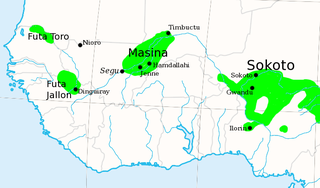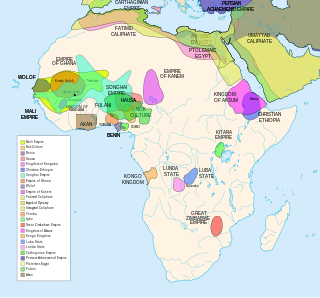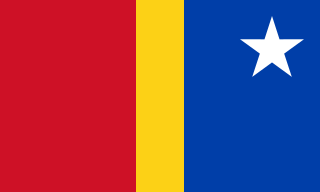The history of Nigeria can be traced to settlers trading across the middle East and Africa as early as 1100 BC. Numerous ancient African civilizations settled in the region that is known today as Nigeria, such as the Kingdom of Nri, the Benin Empire, and the Oyo Empire. Islam reached Nigeria through the Borno Empire between and Hausa States around during the 11th century, while Christianity came to Nigeria in the 15th century through Augustinian and Capuchin monks from Portugal. The Songhai Empire also occupied part of the region.
Shaihu Usman dan Fodio, born Usuman ɓin Foduye, was a religious teacher, revolutionary, military leader, writer, and promoter of Sunni Islam and the founder of the Sokoto Caliphate.
Hausa–Fulani are an ethnic group of the Sudan, a vast region south of the Sahara, encompassing the Sahel, they are located primarily in the Northern region of Nigeria. Hausa-Fulani are people of mixed Hausa and Fulani origin, most of whom speak a variant of Hausa as their native language, although about 6 to 12 million speak Fula language. Many Hausa-Fulanis identify primarily as Hausa and secondarily as Fulani.

The Fulani War of 1804–1808, also known as the Fulani Jihad or Jihad of Usman dan Fodio, was a military conflict in present-day Nigeria and Cameroon. The war began when Usman dan Fodio, a prominent Islamic scholar and teacher, was exiled from Gobir by the King Yunfa, one of his former students.

The Sokoto Caliphate was an independent Sunni Muslim Caliphate in West Africa that was founded during the jihad of the Fulani War in 1804 by Usman dan Fodio. It was abolished when the British conquered the area in 1903 and established the Northern Nigeria Protectorate.

Kebbi is a state in north-western Nigeria with its capital at Birnin Kebbi. The state was created out of a part of Sokoto State in 1991. Kebbi State is bordered by Sokoto State, Niger State, Zamfara State, Dosso Region in the Republic of Niger and the nation of Benin. It has a total area of 36,800 km².

Northern Nigeria was an autonomous division within Nigeria, distinctly different from the southern part of the country, with independent customs, foreign relations and security structures. In 1962 it acquired the territory of the British Northern Cameroons, which voted to become a province within Northern Nigeria.

The Hausa Kingdom, also known as Hausa Kingdoms or Hausaland, was a collection of states started by the Hausa people, situated between the Niger River and Lake Chad. Hausaland lay between the Western Sudanic kingdoms of Ancient Ghana and Mali and the Eastern Sudanic kingdoms of Kanem-Bornu. Hausaland took shape as a political and cultural region during the first millennium CE as a result of the westward expansion of Hausa peoples. They arrived to Hausaland when the terrain was converting from woodlands to savannah. They started cultivating grains, which led to a denser peasant population. They had a common language, laws, and customs. The Hausa were known for fishing, hunting, agriculture, salt-mining, and blacksmithing. By the 14th century Kano had become the most powerful city-state. Kano had become the base for the trans-Saharan trade in salt, cloth, leather, and grain. The Hausa oral history is reflected in the Bayajidda legend, which describes the adventures of the Baghdadi hero Bayajidda culmulating in the killing of the snake in the well of Daura and the marriage with the local queen Magajiya Daurama. According to the legend, the hero had a child with the queen, Bawo, and another child with the queen's maid-servant, Karbagari. Though the Hausa states shared the same lineage, language and culture, the states were characterized by fierce rivalries with each other with each state seeking supremacy over the others. They constantly waged war on each other and would often work with invaders to the detriment of their sister states, hindering their collective strength.

The Zazzau, also known as the Zaria Emirate is a traditional state with headquarters in the city of Zaria, Kaduna State, Nigeria. As of September 2019 the emir was Alhaji Shehu Idris.

The Hausa are the largest ethnic group in Sub-Saharan Africa. The Hausa are a diverse but culturally homogeneous people based primarily in the Sahelian and the sparse savanna areas of southern Niger and northern Nigeria respectively, numbering over 80 million people with significant indigenized populations in Benin, Cameroon, Ivory Coast, Chad, Sudan, Central African Republic, Republic of the Congo, Togo, Ghana, Eritrea, Equatorial Guinea, Gabon, Senegal and the Gambia.

The Fulajihads were a series of jihadist wars that occurred across West Africa during the 18th and 19th centuries led largely by the Muslim Fula people. The jihads and the jihad states came to an end with European colonization.

African empires is an umbrella term used in African studies to refer to a number of pre-colonial African kingdoms in Africa with multinational structures incorporating various populations and polities into a single entity, usually through conquest.

The Kano Emirate was a Muslim state in Northern Nigeria formed in 1805 during the Fulani jihad when the Muslim Hausa-led Sultanate of Kano was deposed and replaced by a new emirate which became a vassal state of the Sokoto Caliphate. During and after the British colonial period, the powers of the emirate were steadily reduced.

The Ilorin Emirate is a traditional state based in the city of Ilorin in Kwara State, Nigeria. It is a prominent city largely populated by the Yoruba speaking people group of West Africa. It is considered by some to be one of the Banza Bakwai, or copy-cats of the Hausa Kingdoms.

The Kebbi Emirate, also known as the Argungu Emirate is a traditional state based on the town of Argungu in Kebbi State, Nigeria. It is the successor to the ancient Hausa kingdom of Kebbi. The Emirate is one of four in Kebbi State, the others being the Gwandu Emirate, Yauri Emirate and Zuru Emirate.
The Sultanate of Kano was a Hausa kingdom in the north of what is now Nigeria that dates back to 1349, when the contemporary King of Kano, Ali Yaji (1349-1385), dissolved the cult of Tsumbubra, accepted Islam and proclaimed Kano a Sultanate. Before 1000 AD, Kano had been ruled as an Animist Hausa Kingdom. The Sultanate lasted until the Fulani jihad in 1805 and the assassination of the Last Sultan of Kano in 1807. The Sultanate was then replaced by the Kano Emirate, subject to the Sokoto Caliphate. The capital is now the modern city of Kano in Kano State.
The Jobawa are a sub clan of the Fulani ethnic group, Primarily found in the old Eastern Kano they were the First Fulani Clan to make contact with the Hausa People.
Islamic extremism is adherence to a fundamentalist interpretation of Islam, potentially including the promotion of violence to achieve political goals. In contemporary times, Islamic extremism in Northern Nigeria is typified by the Boko Haram insurgency and the proselytizing campaigns of salafist groups like the Izala Society.
The history of Northern Nigeria covers the history of the region form pre-historic times to the modern period of Northern Nigerian state.










